The road to war and back: how Ukrainians are rebuilding the liberated Kharkiv Oblast

Among the typical landscapes of Kharkiv Oblast – small rivers and towns, untouched pine forests stretching up to the sky, and the tall chimneys of industrial facilities – the limit of the Russian occupation is clearly visible.
The surrounding terrain changes: the road from civilisation leads to war and back again. The roadside is lined with devastated houses and warning signs indicating mined areas. Bridges are broken, and the road surface has been destroyed by tracked vehicles.
But the locals who survived the occupation are getting down to work and restoring the villages, roads and river crossings. There is a renaissance of hospitals, which are being turned into military hospitals.
In addition to the local residents of Kharkiv Oblast, Ukrainians are arriving from Kherson, Donetsk and Kyiv Oblasts. All of them feel the need to restore the country after its devastation by the invaders.
Some have lost their homes and their normal lives, but they’re not about to give up. In anticipation of Victory, they are rebuilding the oblast closest to Mordor which the occupiers are so mercilessly trying to destroy.
Ukrainska Pravda.Zhyttia visited Kharkiv Oblast to see how life is being rebuilt after the Russian occupation.
Photo by Hryhorii Vepryk.
A tour around the liberated territories
50 kilometres before Balakliia, one of the bridges was broken. It had folded in half like a cookie soaked in milk. Next to it is its temporary metal counterpart.
This is a kind of point of no return and a red flag: we are gradually approaching the place where the war was. There are signs along the road: "Mines! Do not walk on the roads!"
Hryhorii is driving. He is a soldier; he signed up of his own accord. He has a short period of leave, and he is spending it on a trip to the liberated Kharkiv Oblast. Before the full-scale invasion, he worked as a photographer and videographer, and at the contact zone he operates drones.
On this expedition, he is taking pictures of road builders and the reconstruction of the oblast. This soldier has seen death and destruction, and now he wants to see how the reconstruction is going.
"In early August, I had a feeling that Kharkiv Oblast would have new borders like Donbas in 2014," Hryhorii says. "Because a soldier sees 10 metres, three birch trees, two trenches. I had been in Kharkiv Oblast since spring 2022, and in September, I found myself quite unexpectedly in Oskol near Izium. From a soldier's perspective, it was like teleportation: everything happened so fast, there was no time to realise it."
The wheels of his car rumble loudly on the road. The paving has been destroyed by the tracks of heavy military equipment, and some of his words are lost in the noise.
"Our area was Kreminna–Svatove. Once I had some free time, I zoomed in on the map. I zoomed [the map] out and realised that further down the road was Svatove, which was all over the news. So it turned out that we weren’t sitting in a nameless forest belt, but in a key area," the soldier laughs.
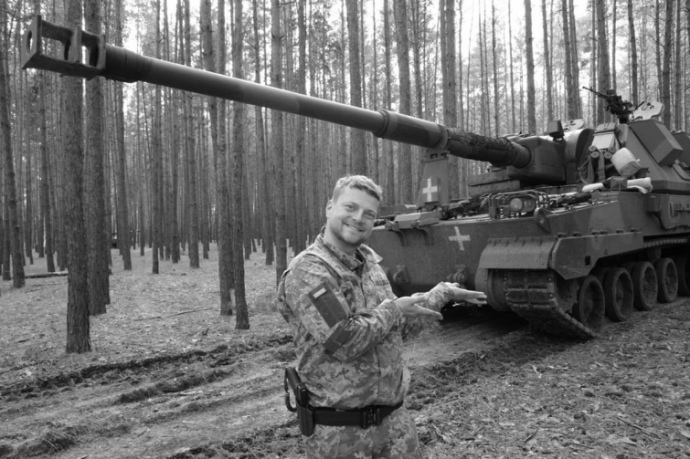
Hryhorii says he talked to local residents during the advance of the Ukrainian Armed Forces and the clearing of the liberated villages. In his opinion, the people who survived the occupation are divided into two types.
In one of the liberated villages, the military needed a tractor to pull out a tank. They went to the managers of the dairy, which had continued operating even during the occupation. But their request met with a refusal, covered by a lie that the equipment had malfunctioned.
A few days later, one of the dairy's managers came to the soldiers and gave them the keys to the tractor. He explained that most of the employees had supported the occupation and were collaborators. He had managed to leave, and at the first opportunity, he came back.
"But I also met a lot of good people," says Hryhorii. "There was a man at one crossroads who handed out pies to the military for a week after the liberation. There were also fishermen who brought their catch because they had nothing to share. And some people would bring fish and come for the money in the morning, arguing that the fish were not free," he continues.
Hryhorii said he had learned how to identify collaborators and "Russian world" supporters after he had been in a few liberated villages. All of those people had something in common – they walked around the settlement with their heads lowered and avoided Ukrainian soldiers in every possible way.
Around the third corner, which resembles a winding mountain road, there is a yellow fence with barbed wire. One of its walls has been hastily covered up with tin sheets. Something enormously large, heavy and hostile was here not so long ago. It was a combat vehicle that belonged to the occupiers.
Several industrial and administrative buildings have different-sized holes in them – from bullets and tank shells.
"Liberation for me is when civilisation enters cities and villages again. And the first thing is to rebuild roads and crossings, because roads are not just ways to the front, but also evacuation, providing access for volunteers, doctors, and the postal service," Hryhorii says.
The temporary bridge
The town of Balakliia itself did not "suffer" too much from the attacks. Windows are blackened from nearby fires, and several shops and private houses have been destroyed. The town is already recovering from the occupiers’ invasion. Bridges and river crossings are being rebuilt as the first priority here to simplify logistics for Victory.
Andrii, Serhii, Ivan and the other men in one of the repair teams are from Balakliia. They survived the occupation at home, and now they are rebuilding the town themselves. Their chapped hands and faces speak of their long hours of work in the frosty winter wind.
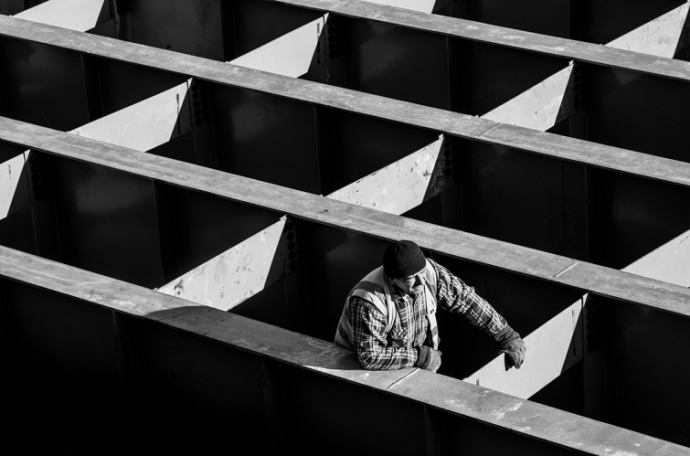
"Andrii, to the right!" one man in workwear shouts. It’s Illia from Mariupol, the only member of the team who is not a local.
Illia is tall and thin and has a black beard and dark eyes. He’s standing near the repair team and telling a tractor driver where to point a bucket full of gravel.
Illia and his colleagues are building a temporary crossing over the river Balakliika. The occupiers destroyed one of the bridge supports, making a big hole in the middle. Thin rods stick out of it, indicating that it is dangerous to anyone who might be curious.
When the team has finished pouring gravel in the joints between the plates, Illia agrees to have a chat.
Illia from blockaded Mariupol
Illia says he had two cars, two apartments and his own house in Mariupol before the invasion. He was in the city for a month after the invasion started, and then he miraculously managed to escape.
"I’ve realised that I was so strong in Mariupol! I succeeded in everything I started! And I’ve seen a lot of different people during the war since then! Some of them had a biased attitude or didn’t understand what we had to go through," Illia says, his voice taking on a note of bitterness.
One of his apartments burned down to the ground when a Russian rocket hit a room through a balcony. His house burned down as well, and the car – Illia had taken his car to the garage just before it was hit in a precision strike by the occupiers.
The second apartment became a shelter for Illia’s parents and his brother, his daughter, his new girlfriend and her child, and even his ex-wife and her new husband. The apartment was located on the second floor of a nine-storey residential building.
"We set our alarm for 04:30 every morning – the Russians would start bombing then. It was safe in the apartment, and much warmer than in the basement – we couldn’t take the two children there.
Two weeks later, the Russians started advancing and bombing our neighbourhood heavily. It was the first time explosions had woken me up – I grabbed the children and took them into the hallway. A few seconds later, all the windows shattered and it was -8°C in the apartment. There was no sense in staying there, so we went down to the basement," Illia recollects.
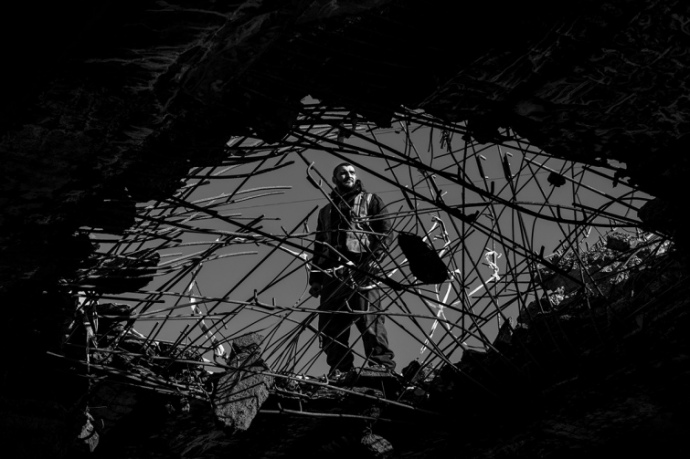
Illia takes out a cigarette and breaks into a smile. When he emerges from his memories, he tells us how he wished all the women in the entrance a happy International Women’s Day on 8 March.
"That morning I left the building at 5 am to chop some wood, as always. It had snowed overnight, and my first idea was to write something for them with my footprints on the snow. But snipers would have ‘complimented’ me on my creativity before I’d finished writing the name of the month," he remarks jokingly.
A few minutes later, Illia saw a man with a cart packed full of metre-long roses. This passer-by had probably either opened up his own shop or looted someone else’s. The men quickly agreed on the price of the flowers in alcohol terms.
Illia says, smiling, that it was on Woman's Day that he found out that the entrance of the apartment block was full of people. Everyone was scared and had tried not to abandon their homes. He recalls that he miraculously survived several times.
For instance, when he went to buy water at the Metro supermarket, which was already being looted by locals, a few S-300 missiles fell near it.
"There are bodies of people lying on the ground around me, and here I am, born under a lucky star. There wasn’t a scratch on me, but I was heavily shellshocked – I couldn’t hear a thing, blood was coming out of my ears," Illia says with a huge grin.
He quickly adds that he was never scared for himself – he only worried about the wellbeing of his daughters, parents and brother.
"By some miracle we managed to evacuate! I had a long black beard, and I’m covered in tattoos. They made me undress at every checkpoint. I have no idea how they let me through. Maybe because there were children in the car," Illia remarks.
Illia is still in touch with his 64-year-old neighbour from Mariupol, who looks after his cats. She says that the occupiers turned all the apartments upside down and took all the men’s clothes, even worn-out underwear.
"If they think they can break us simply by taking away our valuables, they’re wrong. It’s a pity, though, that 20 years of my life has gone down the drain. I’m afraid I won’t be able to get back on my feet again.
After Victory, my whole family will get together – we’ll all be over the moon! I’ll spend a month drinking, then I’ll go and take my life back. I’ll go back to liberated Mariupol and build it from scratch, because this is my land," Illia says, sharing his plans.
His speech is interrupted by one of the workers.
"Andrii, can you move your vehicle, please, so we can take a picture and report about the work we’ve done," he shouts.
It’s Friday afternoon, so all the men are anticipating the end of their shift. Illia gestures, inviting them to the trailer – he wants to go home too.
Down under the bridge, the river is roaring. A tractor passes us – it will rest until Monday, just like the men.
"We’re a real dream team, I’m telling you! Not one of us has ever built a bridge before! We’re building it with our hearts as well as our hands," Illia says, smiling.
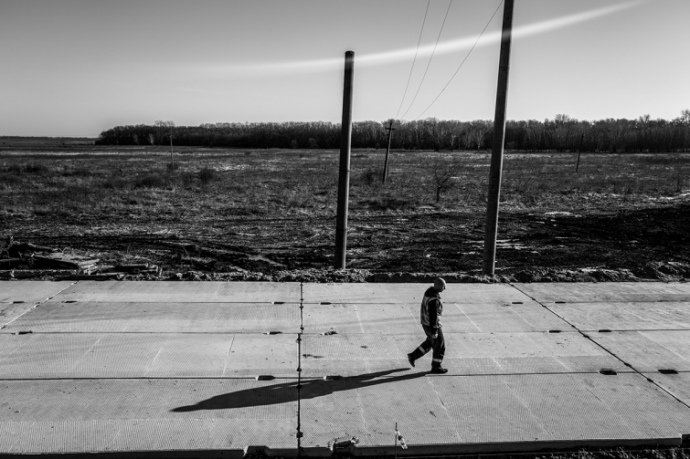
In the trailer
Some of the men are getting changed in the trailer, some are drinking coffee, Andrii is lighting a cigarette. There is a mini-stove – actually a metal container – in the centre, heating the trailer. Illia introduces me to his workmates, saying, "Get ready for an interrogation!" He grins and goes into the corner to change out of his dirty work clothes.
The trailer is filled with the men’s laughter as they continue to get changed and smoke. An older man called Oleksandr even produces a cigarette case of roll-ups. Someone accepts his offer and takes a drag. The trailer quickly fills with smoke.
It gets harder to breathe, but the men relax and become more talkative. They speak in unison, loudly, interrupting one another, but then take turns.
"We survived the occupation sitting in the cellars at home, in Balakliia," says Andrii.
He is about 40, with dark hair and a beard, his face tanned and weatherbeaten from constant work outdoors. He’s of medium height, with kind eyes and black "workman’s" hands. He has his third cigarette between his fingers. Andrii used to work as a carpenter and do finishing work. On 24 February, he went to the carpentry shop as usual and he worked until 26 February, when the Russians came.
"There were some people who openly supported the occupation. There were also those who did it secretly, but maliciously - they disclosed our soldiers’ positions and the ATO soldiers’ places of residence. [The ATO or Anti-Terrorist Operation is a term used from 2014 to 2018 by the media, the government of Ukraine and the OSCE to identify combat actions in parts of Donetsk and Luhansk oblasts against Russian military forces and Kremlin-backed separatists – ed.] Or they came to the soldiers’ wives with interrogations - on a tip-off, of course. There was f**k-all that was good about them. There was no money unless you had cash. And prices shot up! One roll of toilet paper cost 50 hryvnias," he continues. [Before the invasion you could buy a whole pack of four toilet rolls for that price.]
"70 hryvnias for salt!" adds Serhii [almost $2, whereas before the invasion it cost less than $1].
Serhii stands out among the men with his clean-shaven cheeks – he looks like a manager, but his work clothes speak for themselves. Before the full-scale invasion, Serhii worked in Kharkiv - he used to build high-rise apartment blocks. On 21 February, the crane broke, and everyone went home.
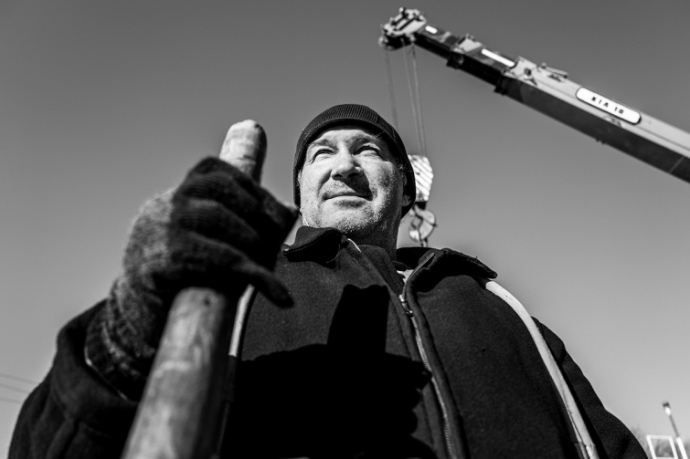
Oleksandr at work on the reconstruction of the bridge
"A box of matches cost 35 hryvnias, and lard was 350 hryvnias!" the men say. [Both prices are three times more expensive than before the full-scale invasion.]
"The price of food was astronomical. Everyone was looking for it, although everyone tried to move around less. As soon as the Buryats [Russian soldiers from Buryatia] arrived, they loved looting - they broke into apartments, looted hospitals and pharmacies. They even ripped out toilets, because it was the first time in their lives they’d seen such a miracle," Andrii says again.
"And the network hub for the internet was torn off the poles - they wanted to take it home. And they didn't understand that without wires, it's just a tin box. Such warriors!" Serhii says, smiling.
"They probably thought they’d make their yurts cosy with a toilet and the internet," says Ivan.
The small trailer is once again filled with the men's laughter, replacing the sadness and pain, and mingling with the cigarette smoke.
"What about medical assistance?" I ask.
"What are you talking about? There were no doctors, no ambulances – nothing. My neighbour's grandmother was wounded in the thigh, and she bled to death in 10 minutes because her artery was hit. What did I do? I held the rag tight, because what was I supposed to do if she had a wounded artery?" Andrii says indignantly.
"And there were no communications! How many people died because of that?! They shot at places where people were trying to pick up an internet connection. If anyone climbed a tree to tell their relatives they were still alive and everything was fine, they were hit. The shelling was like a church service – morning, noon and night," adds Serhii.
"And when our soldiers entered the settlement, of course it became easier. Because there was a connection, and prices became more affordable. You could afford to buy sausages. Work appeared: I came to [rebuild] the bridge, my wife came to work in the bakery," Andrii continues.
He notes that work provides stability, and that is a special blessing in the liberated territory. And then he dreamily adds that later, maybe, he will go to Izium to build a new bridge, and in the spring his family will be on their feet again.
"The clumsy bastards couldn't even blow it [the bridge] up normally! They just spoiled it! Trenches were dug along the river for that. Were they preparing to repel an attack from the water? Morons! Ugh," Ivan says, with feeling, and pours boiling water over some instant coffee.
The men leave the trailer unnoticed, and Ivan goes outside with his cup. Only Serhii remains in the workmen’s mess.
He says he broke both his heels during the occupation. So he spent the "unfavourable" time [of the occupation] in plaster.
"A shell exploded near the house of an acquaintance of mine. The shock wave damaged the roof. I agreed to help fix the slate, but there was shelling, I was blown off the roof and landed on my heels. And then pain shot through my legs," the builder recalls.
Fortunately, there was electricity in the hospital, so he was X-rayed and his limbs were put in plaster.
"Maybe it's for the best that I was in bed the whole time until liberation. When our soldiers entered the settlement, I could walk around the room in a cast. I really wanted to meet them too!" he exclaims with boyish delight. "I am very grateful to our guys that they were able to enter the settlement almost without destroying anything, and we are back at home… More work has appeared!"
On the way to the military hospital
We continue our journey and return to the highway. There is an unharvested harvest of sunflower along the road. The flowers are bent double under the weight of their heads.
White ribbons are strung on the stems every metre along the road. This is a message from the sappers: the mines have not been cleared from this line. Here and there, fragments of burnt-out Russian equipment are lying on the side of the road.
Hryhorii notes that these are small remnants of the invaders’ heavy weapons.
"Behind every bush, on every street of every village and intersection, there was a destroyed tank or infantry fighting vehicle. There were so many of them that it felt like it was a computer game and someone had copied the same element many times. It didn't look realistic at all," he says.
"Was it scary?" I ask.
"Every time something flew past or whistled! Because I couldn't tell by ear who had fired the mortar and where it was going! After a concussion, all whistles generally sound the same.
One day we were driving out of a combat task, and we saw a magnificent fireworks display blooming beautifully. And two seconds later, it became clear that it was us who were being shot at with a load of Grads [multiple rocket launchers]. And phosphorus is incredibly beautiful! Until you realise that death is falling from the sky!" Hryhorii explains.
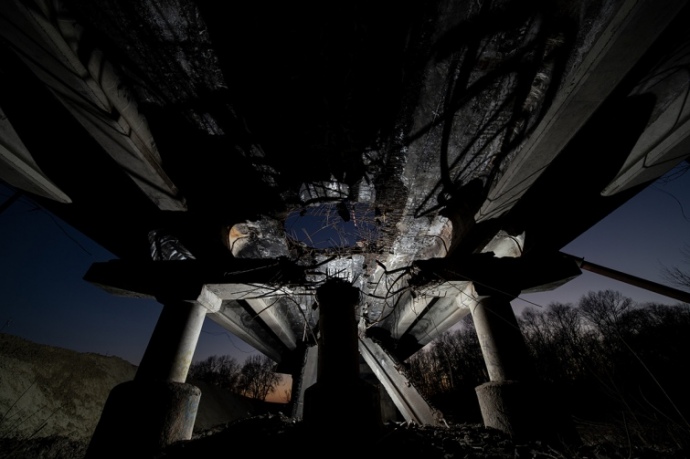
We drive in silence for a few minutes, each immersed in thoughts and memories.
"You know, I only saw our tanks up close for the first time in August.
And once a Pion (a self-propelled artillery installation – ed.) was delivered at night. The officers were so happy, like children. Because with these machines, you can make huge holes in the Russians." Hryhorii spreads his arms wide and smiles. "One officer came out ready to kiss that gun. The only things that made that man so pleased were the photos of his children, whom he hadn’t seen since March, and this huge piece of artillery."
Hryhorii says that during shelling, it was much easier for him to overcome his fear when he had a camera at hand.
"This war is filmed a lot: on drones, body-worn cameras on soldiers, phones... It has become too media-driven, and that makes it even more surreal. One-on-one, like in the movies, only the picture is worse – more sharp turns of the camera, fewer thought-out details.
After all, you can get out your phone, go on Telegram, and see a Russian's leg being ripped off or a tank being torn apart. And even smile a little, without remorse or humanity."
The car starts roaring like an animal again on the damaged asphalt. We are approaching another city in Kharkiv Oblast.
The military hospital in the district hospital
The manager of the military hospital, Viktor Viktorovych, comes out to meet us. He is too young to be a hospital manager, about 35. He has an unusual bright red beard, which contrasts with the black uniform. I can barely keep up with him.
Firstly, he takes me to the waiting room: it's dark and packed with boxes.
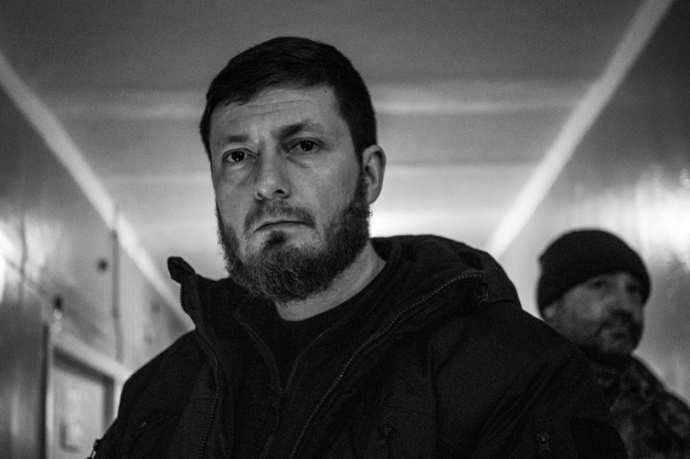
"Upon admission to the hospital, each soldier receives a personal hygiene pack, especially new underwear, socks, and personal hygiene products," the soldier says as he begins the tour.
He holds out a package containing one of these sets, then turns around and walks over to the corridor.
"We set the tables for the soldiers. There’s always tea and biscuits because they might not have eaten for several days before. Meals have been set up so that the soldiers can get 5-7 meals at a convenient time for them," explains Viktor Viktorovych.
The tour speeds up and you have to turn your head more quickly. We pass the assembly hall and go upstairs to the second floor. Previously, it was one of the departments of the civilian hospital, but now it has been equipped for the needs of a military hospital.
There are made-up cots in the corridors, and warm and delicious smells in the room: there is no smell of medicines or hostility. We turn to the surgical department.
Viktor Viktorovych complements the "landscape" with brief comments and shows me the operating rooms and the future operating unit. He says the room was cluttered, but soon they will put up two tables and intensive care beds.
Now in the large room, divided into three parts, there are only stripped walls and replaced plumbing. The old blue Soviet tiles are hanging by a thread. Given the changes that the hospital has undergone in just a month of Viktor Viktorovych's management, his plans for the arrangement of the surgical unit seem quite realistic.
"The floor can accommodate about 150 wounded people. Up to 16 operations are performed per day. We can accept up to 600 military personnel in total," Viktor Viktorovych says, speaking in short sentences.
As we approach the ward, a man's voice can be heard from behind the door, telling a lively story. The hospital manager knocks on the door and opens it a little, and the voices in the ward fall silent.
Inside, the light is dim: the ward’s windows have been covered with several strips of heavy, thick fabric. The beds here are different, modern and efficient; the contrast is striking.
Viktor Viktorovych asks the patients about how they’re feeling, about their diet, and about their daily lives. Gently, though somewhat sternly, he asks, "Have you washed all your clothes?" The men respond in unison, "Yes, everything is fine." Viktor nods and walks quickly out of the ward.
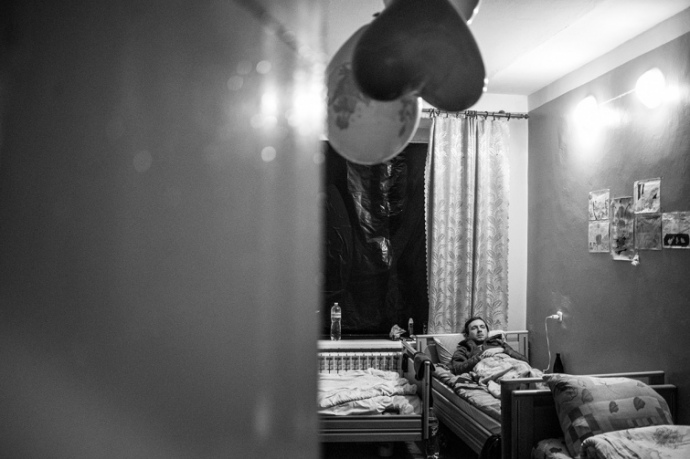
As we walk from ward to ward, he says that the hospital beds came from Germany and Switzerland. Volunteers brought them. The old cots were put in the corridors in case there is a large influx of wounded soldiers.
"This is the most optimal way to arrange beds in a ward," Viktor says as we enter the third ward. There are four beds here, just like in the other wards we just visited; that way, the space is used in the most efficient way, but also provides comfort for patients.
The hospital manager approaches a small table that has new books on it: fiction, history, and popular science. He says the books were also brought by volunteers.
Children’s drawings adorn the walls in the corridors, wards and canteen, and even outside the bathrooms. Viktor notes that the drawings help to keep the soldiers going and strengthen their resolve to return to the front.
How military doctors work together with civilian doctors
Our tour is interrupted by a phone call for the fourth time. After answering, Viktor invites Olena, a vascular surgery professor, to join us and hands the rest of the tour over to her.
Olena is tall; she wears a black jumper and has a warm, wide smile. She wears a pendant in the shape of Ukraine’s coat of arms on a golden chain around her neck. When I ask her about it, she smiles and tells me that the pendant was made by one of her patients, who was hospitalised in Zaporizhzhia with a gunshot wound to his hip. Before being discharged, he gave her the pendant, which he’d forged from a sniper’s bullet, as a lucky charm.
Then she quickly changes the subject and talks about the way the military hospital came together in record time.
"I’m here as a vascular surgeon, I help with surgeries for the military, but I also see civilian patients. We try not to segregate our patients into these two groups, but of course we prioritise the soldiers.
We are waiting on all sorts of experts to join us here, because we have to be prepared to treat a larger number of injured and wounded patients. Experience tells us that civilian and military doctors working together can save countless lives and deliver great results," Olena says.
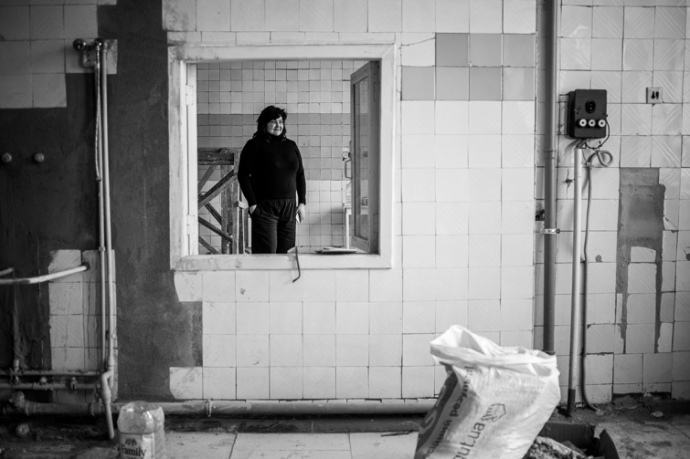
Olena tells me that the soldiers have one distinctive trait: they do not divide work into theirs and someone else’s. For example, if an anaesthetist needed a cabinet, they would ask a soldier for help, and together they would carry it to the anaesthetist’s office.
"I learned this from the soldiers. Now is the time when we should not look back at ranks or achievements from civilian days – we must unite for a common cause… and Victory."
It’s lunch time in the hospital. Olena and other staff members go downstairs to the canteen.
He operated even under the occupation
Oleksandr, a surgeon from Kherson Oblast, is on his way back from lunch.
"Most of my belongings, and my mother-in-law, are still in the occupied territory. They also read all of that there. I’m worried that…" His doubt seems superficial; despite it, he holds himself with confidence and invites me to talk in the doctors’ staffroom.
I go up to the surgery department for the fifth time. It’s starting to feel like Groundhog Day. This time, I enter the first room to my right.
The room, like the wards I visited before, is dimly lit. Curtains are drawn over the windows and two sofas face each other by the walls. A bookcase holds books and documents. A bottle of perfume, a tube of toothpaste and a toothbrush are on a shelf nearby, and a little to the side, there is aftershave and shaving cream.
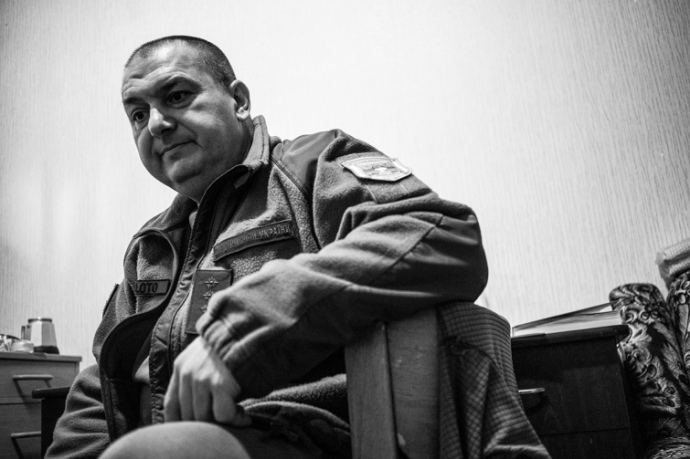
Oleksandr is middle-aged, not very tall, and of a fairly average build. He articulates well when he speaks, there is even some pride in his voice: he was the head of the surgical department in Kherson Oblast, and now he is a senior resident.
He was able to escape the Russian occupation with his family at Easter. Two weeks later, he voluntarily enlisted in the army.
The first thing he does in the office is put his metal plate, which also holds his mug and spoon, on a shelf of the bookcase with a clatter. Then he sits on the sofa across from it and tells me about a particularly challenging patient of his.
"Three days ago a soldier with a chest wound was brought here. An X-ray suggested there was blood in his lungs. Turned out he had a perforating heart wound. We operated on him, stopped the bleeding, and sent him to Kharkiv," Oleksandr says.
"It’s like a conveyor belt here. We were preparing for a large influx, trying to make sure they can at least spend a night here. After the trenches, having a shower and a proper meal and sleeping in a warm bed is 50% of the treatment."
He notes that soldiers can remain in the hospital for two to four weeks. If they have not recovered during that time, they are sent to a military medical commission, which has the authority to extend a soldier’s sick leave.
Oleksandr shows me a folder with the list of injured soldiers; there are more than 40 names on the list. Each piece of paper is covered in small writing next to the printed list of surnames.
He resumes his place on the sofa. He looks deep in thought. Oleksandr is engrossed in memories, which he continues to share.
"The war caught me in my home town in Kherson Oblast. When I got to work, I saw Chornobaivka ablaze. By midday, the first casualties started arriving at the hospital.
Columns of Russian forces were advancing towards the bridge in Kherson, but they didn’t touch us. Their task was to advance as far as possible," he says in a sad voice.
He adds that there had been a lot of tension before the war started.
"A ground offensive is a medieval tactic, there are a lot of losses. Only a madman could dare to do that!" Oleksandr emphasises the word "madman".
The sound of his voice fills the room, then there is silence.
"More injured soldiers were brought in on the second day, but then the temperature dropped. Some people froze to death, others were killed. The Russians drove around from place to place where there’d been attacks and killed those who’d survived. Mostly their own soldiers," Oleksandr recalls.
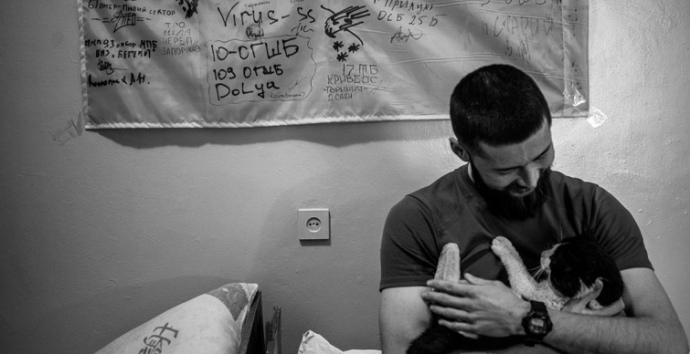
Oleksandr sighs heavily.
"You know, Russians have this one trait… They want to contaminate everyone they come into contact with," he says thoughtfully. "At first, when they arrived, our surprise overwhelmed our fear. Then it was replaced with anger at our helplessness."
He sighs another heavy sigh. The door opens and a nurse pops her head in. She reminds Oleksandr that a soldier is waiting, ready to be operated on.
Oleksandr smiles out of the corner of his mouth and his eyes twinkle as he gets up and heads out to fight the occupiers the best way he can: by saving lives.
Viktoriia Andrieieva, Ukrainska Pravda.Zhyttia
Translated by Anton Strii, Myroslava Zavadska, Polina Kyryllova, Elina Beketova, Yelyzaveta Khodatska and Olya Loza
Edited by Teresa Pearce
